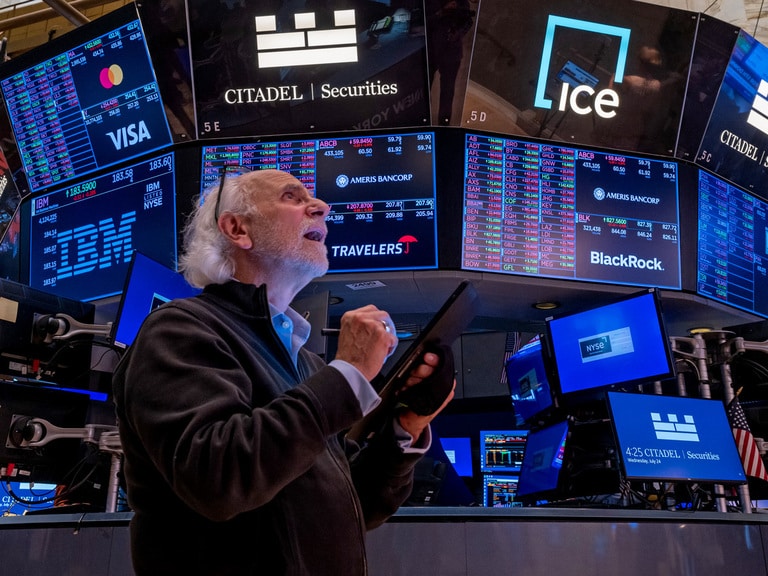Say the word ‘blockchain’ and many people’s first thought is crypto. But cryptocurrency is just one use case of blockchain, says Christian Magoon, Founder and CEO of Amplify ETFs.
“Most people know the crypto-centric names, but there are many more traditional names using blockchain technology or interacting with crypto,” he told the latest OPTO Sessions.
This will become more apparent over time.
“We think in 2025 as the regulatory environment changes, especially here in the US, we’re going to see a lot more pure-play blockchain companies come to market, spin-offs of blockchain units and large conglomerates.
“Certainly there’s an appetite from a regulatory standpoint and a capital market standpoint.”
Early to the Blockchain Game
Magoon likens the prevailing understanding of blockchain technology to the early days of the internet.
“When most people first found the internet, they knew about email or a website, but didn’t really understand the overall technology and all the future businesses that would be built on the internet, whether that’s advertising or search engines or streaming video.”
Gradually, we will gain a deeper understanding of what blockchain is capable of — and, accordingly, all the related investment opportunities.
“Most people… haven’t seen all the other use cases that are likely to emerge across a dozen or so industries because of the efficiency, transparency and decentralized nature a digital world requires now.
“Many of the ways we do business are stuck 50–100 years ago, in physical transactions and with middle firms having to verify data. Blockchain really solves that.
“That’s where we think we’re going longer term. That’s the excitement — you can get some of the alpha now from the crypto side, and then hopefully be early to the game when it comes to some of the other blockchain applications and industries we believe will emerge.”
Investing in the Technology
Amplify are experts in the blockchain universe thanks to their flagship BLOK ETF.
Beyond pure-play bitcoin, Magoon says investors should watch “companies that are really working on the long-term blockchain technology. Many of those are financial service companies, transaction companies, payment companies. They aren’t as sensitive to the moves in crypto, but act as a nice barbell to even out some of the volatility in the space.”
Which sub-themes does Magoon think investors should pay close attention to? “In BLOK, our largest segment is transactional players, companies that operate crypto exchanges or are processing payments via blockchain or accepting cryptocurrency.
“These companies aren’t as crypto-centric in many people’s minds, but are processing a lot of crypto-related transactions.”
However, there is some catching up to do.
Bitcoin surged 125% last year, but these sorts of players are lagging. “If you look at Visa [V], MasterCard [MA], Block [XYZ], those companies gained anywhere from 12–13% to 23–24% — about half what the overall blockchain crypto equity space gained at 53–54%, and considerably less than bitcoin itself.”
Indirect Exposure
Investors can also explore companies with large-scale cryptocurrency holdings, says Magoon — for example, software company MicroStrategy [MSTR] or Japan’s Metaplanet [MTPLF], which buys into crypto as a long-term reserve asset. “[They] own bitcoin on their balance sheet and use financial engineering to not only acquire bitcoin, [but also] provide exposure through convertible bonds to new types of issuers, financial institutions that want access to crypto-like products, but maybe can’t own crypto.”
When it comes to concrete examples, what sorts of things beyond crypto might this technology eventually enable? It is early days, says Magoon, and a lot of initiatives are “future projects” around R&D, but he gives one example.
“IBM [IBM] is building out a food safety blockchain for use by Walmart [WMT] and others to track produce from farm to stores and be able to control their inventory and look at the chain of custody from the farm to the truck, to the ship, to the port, to the truck, to a distribution center, to an actual store, to the shelf where you buy that cucumber or avocado.
“It’s a big deal because that process used to take around 10 days to track … Now that it is on the blockchain, it takes less than two minutes. That’s just one use case.”
However, he cautions, “to understand that, you really have to have analysts that are digging in. You can’t simply have a formula that says we’re going to buy any company that has R&D going into blockchain.”
Disclaimer Past performance is not a reliable indicator of future results.
CMC Markets is an execution-only service provider. The material (whether or not it states any opinions) is for general information purposes only, and does not take into account your personal circumstances or objectives. Nothing in this material is (or should be considered to be) financial, investment or other advice on which reliance should be placed. No opinion given in the material constitutes a recommendation by CMC Markets or the author that any particular investment, security, transaction or investment strategy is suitable for any specific person.
The material has not been prepared in accordance with legal requirements designed to promote the independence of investment research. Although we are not specifically prevented from dealing before providing this material, we do not seek to take advantage of the material prior to its dissemination.
CMC Markets does not endorse or offer opinion on the trading strategies used by the author. Their trading strategies do not guarantee any return and CMC Markets shall not be held responsible for any loss that you may incur, either directly or indirectly, arising from any investment based on any information contained herein.
*Tax treatment depends on individual circumstances and can change or may differ in a jurisdiction other than the UK.
Continue reading for FREE
- Includes free newsletter updates, unsubscribe anytime. Privacy policy





